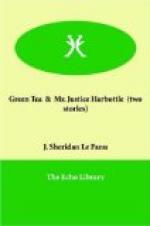A “court of appeal,” such as the false Hugh Peters had indicated, with assassination for its sanction, would be an uncomfortable institution for a “hanging judge” like the Honourable Justice Harbottle. That sarcastic and ferocious administrator of the criminal code of England, at that time a rather pharisaical, bloody and heinous system of justice, had reasons of his own for choosing to try that very Lewis Pyneweck, on whose behalf this audacious trick was devised. Try him he would. No man living should take that morsel out of his mouth.
Of Lewis Pyneweck, of course, so far as the outer world could see, he knew nothing. He would try him after his fashion, without fear, favour, or affection.
But did he not remember a certain thin man, dressed in mourning, in whose house, in Shrewsbury, the Judge’s lodgings used to be, until a scandal of ill-treating his wife came suddenly to light? A grocer with a demure look, a soft step, and a lean face as dark as mahogany, with a nose sharp and long, standing ever so little awry, and a pair of dark steady brown eyes under thinly-traced black brows—a man whose thin lips wore always a faint unpleasant smile.
Had not that scoundrel an account to settle with the Judge? had he not been troublesome lately? and was not his name Lewis Pyneweck, some time grocer in Shrewsbury, and now prisoner in the jail of that town?
The reader may take it, if he pleases, as a sign that Judge Harbottle was a good Christian, that he suffered nothing ever from remorse. That was undoubtedly true. He had, nevertheless, done this grocer, forger, what you will, some five or six years before, a grievous wrong; but it was not that, but a possible scandal, and possible complications, that troubled the learned Judge now.
Did he not, as a lawyer, know, that to bring a man from his shop to the dock, the chances must be at least ninety-nine out of a hundred that he is guilty?
A weak man like his learned brother Withershins was not a judge to keep the high-roads safe, and make crime tremble. Old Judge Harbottle was the man to make the evil-disposed quiver, and to refresh the world with showers of wicked blood, and thus save the innocent, to the refrain of the ancient saw he loved to quote:
Foolish pity
Ruins a city.
In hanging that fellow he could not be wrong. The eye of a man accustomed to look upon the dock could not fail to read “villain” written sharp and clear in his plotting face. Of course he would try him, and no one else should.
A saucy-looking woman, still handsome, in a mob-cap gay with blue ribbons, in a saque of flowered silk, with lace and rings on, much too fine for the Judge’s housekeeper, which nevertheless she was, peeped into his study next morning, and, seeing the Judge alone, stepped in.
“Here’s another letter from him, come by the post this morning. Can’t you do nothing for him?” she said wheedlingly, with her arm over his neck, and her delicate finger and thumb fiddling with the lobe of his purple ear.




